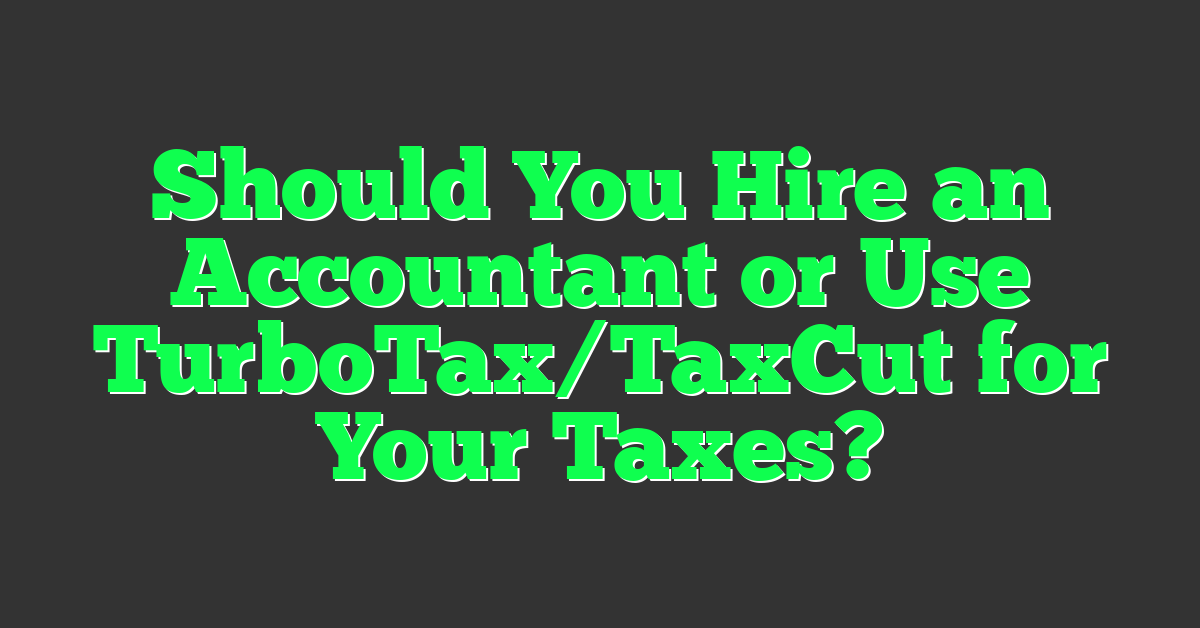Tax season can be a stressful time, especially when deciding between hiring an accountant or using software like TurboTax or TaxCut. Each option has its own set of benefits and drawbacks, and the right choice often depends on your specific financial situation.
I’ve navigated both paths and can tell you that the decision boils down to factors like complexity, cost, and peace of mind. Whether you have a straightforward return or a more complicated financial landscape, understanding the pros and cons of each approach can help you make an informed choice. Let’s dive into what each option offers and how they stack up against each other.
Understanding Your Tax Preparation Options
During tax season, choosing between hiring an accountant or using tax software affects cost, accuracy, and convenience. Each option has distinct advantages depending on your individual circumstances.
Hiring an Accountant to Do Your Taxes
Accountants offer personalized service and expertise for complicated tax situations. Complex returns, involving investments or multiple income streams, benefit significantly from an accountant’s knowledge. They stay updated on tax laws to ensure compliance and maximized deductions. Fees vary, averaging $273 for an itemized 1040 with Schedule A, but can offer peace of mind.
Using Software like TurboTax or TaxCut
Tax software provides a cost-effective solution for straightforward returns. TurboTax and TaxCut guide users step-by-step, making them accessible for those without extensive tax knowledge. These platforms handle common deductions and credits, ensuring users meet tax requirements. Costs are lower than hiring an accountant, with TurboTax ranging from $0 to $120 depending on features.
Pros and Cons of Hiring an Accountant
Hiring an accountant has its advantages and disadvantages, affecting expertise, personalized advice, and cost considerations.
Expertise and Personalized Advice
Accountants, with their professional training and certification, offer specialized knowledge that tax software can’t match. They analyze financial situations comprehensively and provide tailored solutions, especially for complex tax cases. Personal interaction ensures accuracy and compliance with updated tax laws. They’re also adept at identifying potential deductions and credits specific to your financial scenario, which can maximize refunds.
Cost Considerations
Engaging an accountant involves higher costs compared to software solutions. The average fee for hiring an accountant is around $273, varying based on complexity and geographical location. This investment might be justified for intricate tax situations where the risk of errors and subsequent penalties is high. For straightforward returns, however, the cost of an accountant may not provide significant value over less expensive software options, which range between $0 and $120.
Hiring an accountant can be a strategic choice for those needing detailed expertise and personalized advice, weighed against the associated costs.
Pros and Cons of Using Tax Software
Tax software offers a range of benefits and drawbacks. It’s essential to consider these factors before deciding whether to use tax software for your tax filing needs.
Convenience and Accessibility
Tax software provides unparalleled convenience. It guides users through the process with easy-to-follow prompts. Users can access the software at any time, allowing them to work at their own pace. This flexibility is ideal for individuals with busy schedules.
Many tax software options, like TurboTax and TaxCut, come with mobile apps. This accessibility lets users manage their taxes from anywhere, accommodating travel or remote work situations. Additionally, the software integrates with various financial institutions, simplifying the process of importing data and reducing the likelihood of errors.
Limitations and Potential Errors
Despite its advantages, tax software has limitations. It may not cover all intricate tax scenarios, leading to potential oversights. Users with complex tax situations may miss out on specific deductions and credits without a professional’s guidance.
Errors can also arise from user data input. The software’s accuracy depends on the data provided. Mistakes can occur if users misunderstand questions or input incorrect information. While the software cross-checks entries, it cannot replace the nuanced expertise of a qualified accountant.
Considering the pros and cons helps individuals make an informed decision on whether tax software meets their unique needs.
How to Choose Between an Accountant and Tax Software
Deciding between hiring an accountant and using tax software involves considering several factors. Assess your financial situation and weigh the costs and benefits.
Assessing Your Financial Complexity
Complex financial situations often benefit from professional assistance. If you own multiple properties or run a business, an accountant’s expertise proves invaluable. They handle diverse income streams, deductions, and credits effectively. However, if your tax scenario involves simpler elements like basic income, interest, or standard deductions, tax software like TurboTax or TaxCut can suffice.
Evaluating Costs Against Benefits
Accountants typically charge around $273, which increases with the complexity of your tax situation. This investment might save you significantly on tax liabilities and ensure compliance with all regulations. Conversely, tax software costs range from $0 to $120, offering a budget-friendly solution for straightforward tax returns. However, you may miss out on tailored advice that an accountant provides.
Hire an accountant for complex, multi-faceted financial situations, and consider tax software for simpler, straightforward tax returns.
Conclusion
Choosing between hiring an accountant and using tax software depends on your unique financial situation. For those with straightforward tax returns, tax software offers a cost-effective and convenient solution. However, if you’re dealing with complex financial scenarios, an accountant’s expertise can ensure accuracy and compliance, potentially saving you more in the long run. Weigh the costs and benefits carefully to make the best decision for your tax needs.

